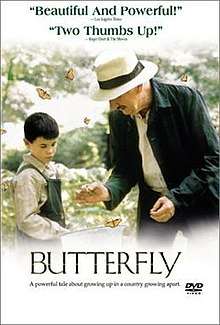Butterfly's Tongue
Butterfly's Tongue or Butterfly (Spanish: La lengua de las mariposas, literally it can also be translated as "The Tongue of the Butterflies"), is a 1999 Spanish film directed by José Luis Cuerda. The film centers on Moncho (Manuel Lozano) and his coming-of-age experience in Galicia in 1936. Moncho develops a close relationship with his teacher Don Gregorio (Fernando Fernán Gómez), who introduces the boy to different things in the world. While the story centres on Moncho's ordinary coming-of-age experiences, tensions related to the looming Spanish Civil War periodically interrupt Moncho's personal growth and daily life.
| Butterfly's Tongue | |
|---|---|
 American DVD release | |
| Directed by | José Luis Cuerda |
| Written by | Rafael Azcona José Luis Cuerda Manuel Rivas |
| Starring | Fernando Fernán Gómez Manuel Lozano Uxía Blanco Gonzalo Uriarte Alexis de los Santos Elena Fernández Tamar Novas |
| Music by | Alejandro Amenábar |
| Cinematography | Javier Salmones |
| Edited by | Ignacio Cayetano Rodriguez Nacho Ruiz Capillas |
Production company | Sociedad General de Televisión (Sogetel) |
| Distributed by | Warner Sogefilms S.A. |
Release date |
|
Running time | 96 minutes |
| Country | Spain |
| Language | Spanish |
| Budget | €2,211,800 |
| Box office | €4,632,493 |
The film is adapted from three short stories from the 1996 book Que me queres, amor? by Galician author Manuel Rivas. The short stories are "A lingua das bolboretas", "Un saxo na néboa", and "Carmiña".
The film received some critical acclaim. It was nominated for the 2000 Goya Award for Best Picture, and it won the Goya Award for Best Adapted Screenplay. Butterfly's Tongue also has a 96% rating on RottenTomatoes.com.[1]
Cast
- Fernando Fernán Gómez as Don Gregorio
- Manuel Lozano as Moncho
- Elena Fernandez as Carmiña
- Uxia Blanco as Rosa
- Gonzalo Martín Uriarte as Ramón
- Alexis de los Santos as Andrés
Plot
In a Galician town in the 1930's, a young boy, Moncho, goes to school for the first time and is taught by Don Gregorio about life and literature. At first, Moncho is afraid that the teachers will hit him since that was the standard procedure, but is relieved to discover that Don Gregorio does not hit his pupils. Don Gregorio is unlike the other teachers; he builds a special relationship with Moncho, teaching him to love learning. Don Gregorio teaches him about The Butterfly’s Tongue on a field trip through the woods, with Moncho having an asthma attack and being assisted by Don Gregorio. Don Gregorio also builds a special relationship with Moncho's father, who is a Republican like him. At this period in Spain, the Republican and the Nationalist factions are fighting a civil war, forcing people to take sides. Moncho's mother is lukewarm towards the Republic, her main concern being belief in God, she eventually sides with the Nationalist rebels.
When Nationalists take control of the town, they round up known Republicans, including Don Gregorio. As Moncho's father is a Republican, his family fears that he too will be arrested if the Nationalists discover his political leanings. In order to protect themselves, the family goes to the town square to jeer the captured Republicans as they are paraded out of the court house and put on a truck. The film ends with Moncho, despite his continued great affection for his friend and teacher, yelling hateful things and throwing rocks at Don Gregorio and the other Republicans, as instructed by his mother, as the truck carries them away, although the last thing Moncho yells are the words for the tongue of a butterfly, espiritrompa (Galician for "proboscis"), a favorite word taught to him by Don Gregorio in an attempt to let his dear friend know that he does not truly mean the words he is yelling.
External links

- Butterfly on IMDb
- Butterfly's Tongue at Box Office Mojo